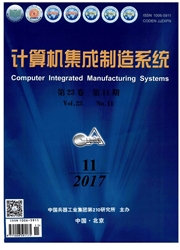

 中文摘要:
中文摘要:
为研究含有单制造商和多零售商的供应网络中基于订单延迟经济生产批量模型的订货库存联合优化问题,以明确联盟博弈和模糊联盟博弈分别研究该供应链在确定和模糊环境下的最优订货/库存策略。证明了有限信息共享时的订货成本博弈和深度信息共享时的存货(及缺货)成本博弈的联盟稳定性和解的存在性。解析和仿真分析表明,扩充Shapley值较比例法则在成本分摊上更为合理,当联合订货分散存货策略转变为集中存货策略时,仅有前者能实现成本分摊的Pareto改进。进而构建联合订货模糊联盟博弈,证明该模糊联盟的核非空,给出模糊Shapley值作为模糊博弈的合理成本分摊方案,并以数值算例演示和验证了解的有效性。最后给出未来的研究方向。
 英文摘要:
英文摘要:
Crisp coalitional and fuzzy coalitional games to seek optimal ordering as well as stocking strategies were studied respectively in order to find a joint optimal policy in managing an economic production quantity with order backlogging based supply network made up of a single manufacturer and multiple retailers. An ordering cost game model under limited information sharing and the other inventory (also stock storage)cost model under more informa- tion sharing were both devised, and their stability of coalitions and existence of solutions were also proved. Conse- quently, analysis and simulation both suggested that, as cost allocation rules, Extended Shapley Value was more reasonable and feasible than Proportional Rule, and particularly, the former was the only one to achieve Pareto im- provement when one switched from decentralized stocking strategy to centralized stocking policy under joint ordering strategy. Furthermore, a fuzzy coalitional game for joint ordering was constructed and the core non--emptiness was proved. Reasonable cost allocation scheme for this fuzzy game by Fuzzy Shapley Value was provided. Numerical ex- periment was conducted to demonstrate and verify the validation of the solution. In the end, future research trend was also pointed out.
 同期刊论文项目
同期刊论文项目
 同项目期刊论文
同项目期刊论文
 Transformation Towards Sustainable Operations in Developing Countries/Areas: A Green Embeded Lean De
Transformation Towards Sustainable Operations in Developing Countries/Areas: A Green Embeded Lean De Managing Risk Aversion for Industrial Low-Carbon Supply Chains with Carbon-Emission Abatement Outsou
Managing Risk Aversion for Industrial Low-Carbon Supply Chains with Carbon-Emission Abatement Outsou Carbon Emission Mitigation Through Regulatory Policies and Operations Adaptation in Supply Chains: T
Carbon Emission Mitigation Through Regulatory Policies and Operations Adaptation in Supply Chains: T Game Theoretic Analysis of Carbon Emission Reduction and Sales Promotion in Dyadic Supply Chain in P
Game Theoretic Analysis of Carbon Emission Reduction and Sales Promotion in Dyadic Supply Chain in P Game Theoretic Analysis of Supply Chain Emission Abatement Considering Vertical Incentives and Chann
Game Theoretic Analysis of Supply Chain Emission Abatement Considering Vertical Incentives and Chann 期刊信息
期刊信息
